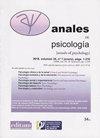El papel mediador de la fuerza del compromiso entre los estilos de procesamiento de la identidad y el bienestar de jóvenes adultos emergentes
IF 1.3
4区 心理学
Q3 PSYCHOLOGY
引用次数: 0
Abstract
Background: Identity styles seek to know how people handle themselves daily in situations looking for an identity commitment. This article aims to find out whether identity styles vary according to age and sex, and to analyze the relation between these identity styles and the strength of commitment with variables of well-being and psychological distress. In addition, it investigates whether commitment mediates between identity styles, well-being and psychological distress. Method: 278 participants (M = 22.03; DT = 2.65), recruited through a non-probabilistic snowball sampling, completed the questionnaires. Results: Women scored higher in strength of commitment and men adopted a more diffusive-avoidant style. Age did not relate to identity style. The informational style correlated positively with well-being variables (flourishing and optimism); the normative style with depression and anxiety and the diffuse-avoidant style correlated positively with psychological distress (depression, anxiety and stress) and negatively with well-being. Finally, the greater the strength of commitment found, the more flourishing and optimism and the less psychological distress there was. The strength of commitment partially or totally mediated the relationship between identity styles and the variables of well-being / psychological distress. Conclusions: The importance of the strength of commitment in personal well-being and the necessity to favour the development of young people´s identity is observed / deduced. Antecedentes: Los estilos de identidad buscan conocer cómo las personas se manejan diariamente en las situaciones buscando un compromiso identitario. En este trabajo se propone conocer si los estilos de identidad varían según la edad y el sexo, y analizar la relación entre estos y la fuerza del compromiso con variables de bienestar y malestar psicológico. Método: 278 participantes (M = 22.03; DT = 2.65) reclutados a través de un muestreo no probabilístico por bola de nieve cumplimentaron los cuestionarios. Resultados: Las mujeres puntuaron más alto en fuerza del compromiso y ellos adoptaron más un estilo difuso-evitativo. El estilo informacional correlacionó positivamente con las variables de bienestar (optimismo y florecimiento); el estilo normativo con depresión y ansiedad y el estilo difuso-evitativo correlacionó positivamente con las variables de malestar (depresión, ansiedad y estrés) y negativamente con las de bienestar. Finalmente, a mayor fuerza del compromiso más bienestar y menos malestar. La fuerza del compromiso media parcial o totalmente la relación entre estilos identitarios y las variables de bienestar/malestar. Conclusiones: Se deduce la importancia de la fuerza del compromiso en el bienestar personal y la necesidad de favorecer el desarrollo de la identidad de nuestros jóvenes.承诺强度在新兴青年身份处理风格与幸福感之间的中介作用
背景:身份风格旨在了解人们在寻找身份承诺的情况下如何处理日常生活。这篇文章的目的是找出身份风格是否因年龄和性别而异,并分析这些身份风格与幸福感和心理痛苦变量的承诺强度之间的关系。此外,它还调查承诺是否在身份风格、幸福感和心理痛苦之间起中介作用。方法:278名参与者(M=22.03;DT=2.65),通过非概率雪球抽样招募,完成问卷调查。结果:女性的承诺强度较高,男性采取了更具扩散性的回避风格。年龄与身份风格无关。信息风格与幸福变量(繁荣和乐观)呈正相关;抑郁和焦虑的规范风格和分散的回避风格与心理痛苦(抑郁、焦虑和压力)呈正相关,与幸福感呈负相关。最后,发现的承诺力量越大,越繁荣和乐观,心理痛苦就越少。承诺的力量部分或完全调解了身份风格与幸福/心理痛苦变量之间的关系。结论:观察/推断了加强个人福祉承诺的重要性和促进青年人身份发展的必要性。背景:身份风格旨在了解人们在寻求身份承诺的情况下如何日常处理自己。本文旨在了解身份认同风格是否因年龄和性别而异,并分析这些风格与幸福感和心理不适变量的承诺强度之间的关系。方法:通过雪球非概率抽样招募的278名参与者(M=22.03;DT=2.65)填写问卷。结果:女性在承诺强度上得分较高,更采用模糊-回避风格。信息风格与幸福感变量(乐观和开花)呈正相关;抑郁和焦虑的规范风格和模糊回避风格与不适变量(抑郁、焦虑和压力)呈正相关,与幸福变量呈负相关。最后,通过更大的承诺,更多的福祉和更少的不适。平均承诺的强度部分或全部取决于身份风格与幸福/不适变量之间的关系。结论:这表明了承诺对个人福祉的重要性,以及促进我们年轻人身份发展的必要性。
本文章由计算机程序翻译,如有差异,请以英文原文为准。
求助全文
约1分钟内获得全文
求助全文
来源期刊

Anales De Psicologia
医学-心理学
CiteScore
3.30
自引率
5.90%
发文量
57
审稿时长
4-8 weeks
期刊介绍:
Anales de Psicologia / Annals of Psychology is a multidisciplinary journal of the various thematic areas of scientific psychology. It publishes original research articles and theoretical review in any of its basic, applied and methodological areas included within psychology.
Publishing, financing, marketing and distribution corresponds Editum: Editions of the University of Murcia (Spain). The organizational guidelines and editorial policies come from the Editorial Team (elected for four years by the Areas and / or Departments of Psychology at the University of Murcia) and the Editorial Board, composed of scholars and experts from different universities and institutions national and international. It is published in print (ISSN: 0212-9728) since 1984 and in Internet publishing (web) (ISSN: 1695-2294) since 2000. Available online full text in pdf from the vol. 1 1984.
Anales de Psicologia / Annals of Psychology maintains a system of exchange with other journals and publications of psychology in the world. Through an free exchange agreement with their respective publishers or entities responsible for editing, these journals and publications are received at the University of Murcia (Biblioteca "Luis Vives", near the Faculty of Psychology) and in return, our journal is sent to libraries and educational and research institutions such centers responsible for editing.
 求助内容:
求助内容: 应助结果提醒方式:
应助结果提醒方式:


